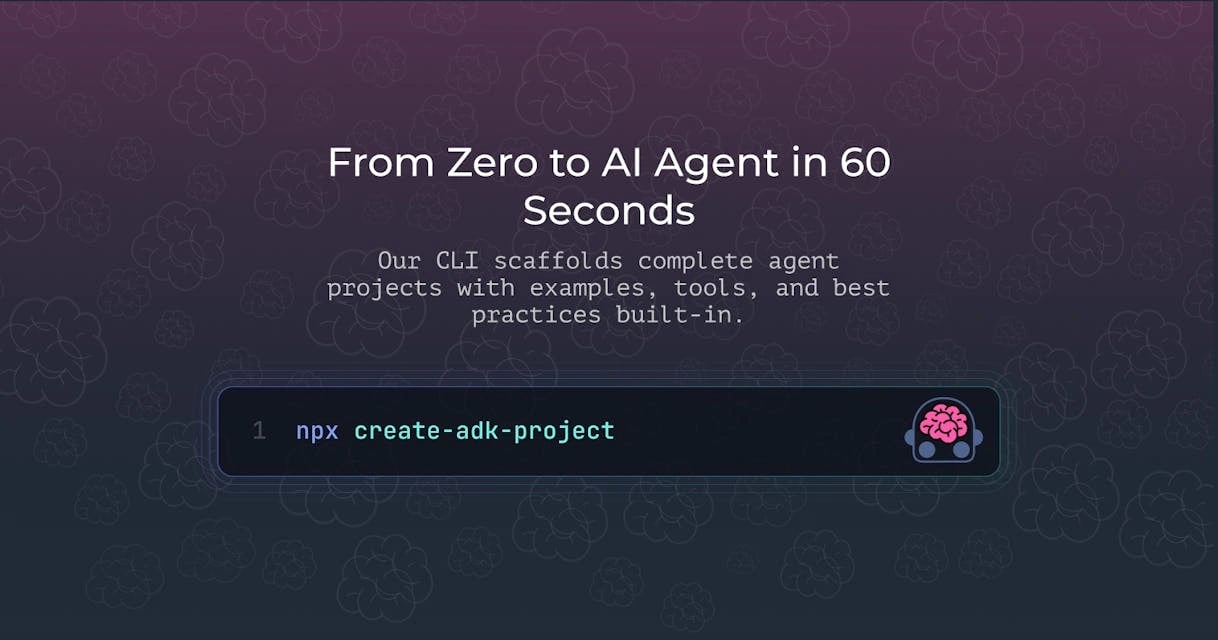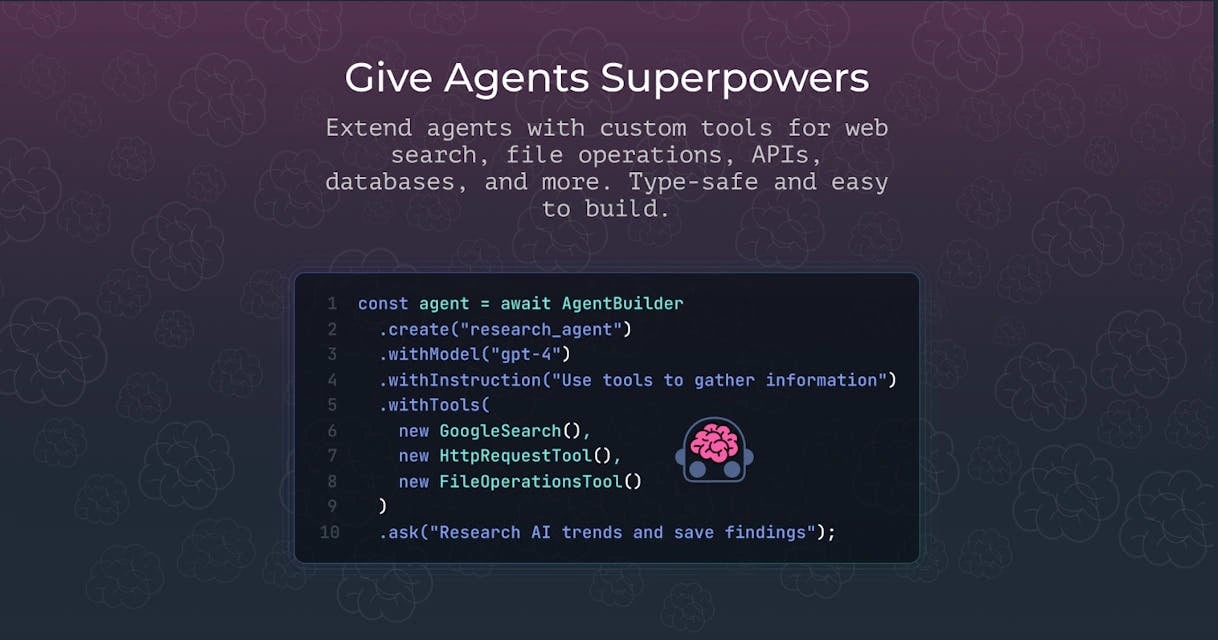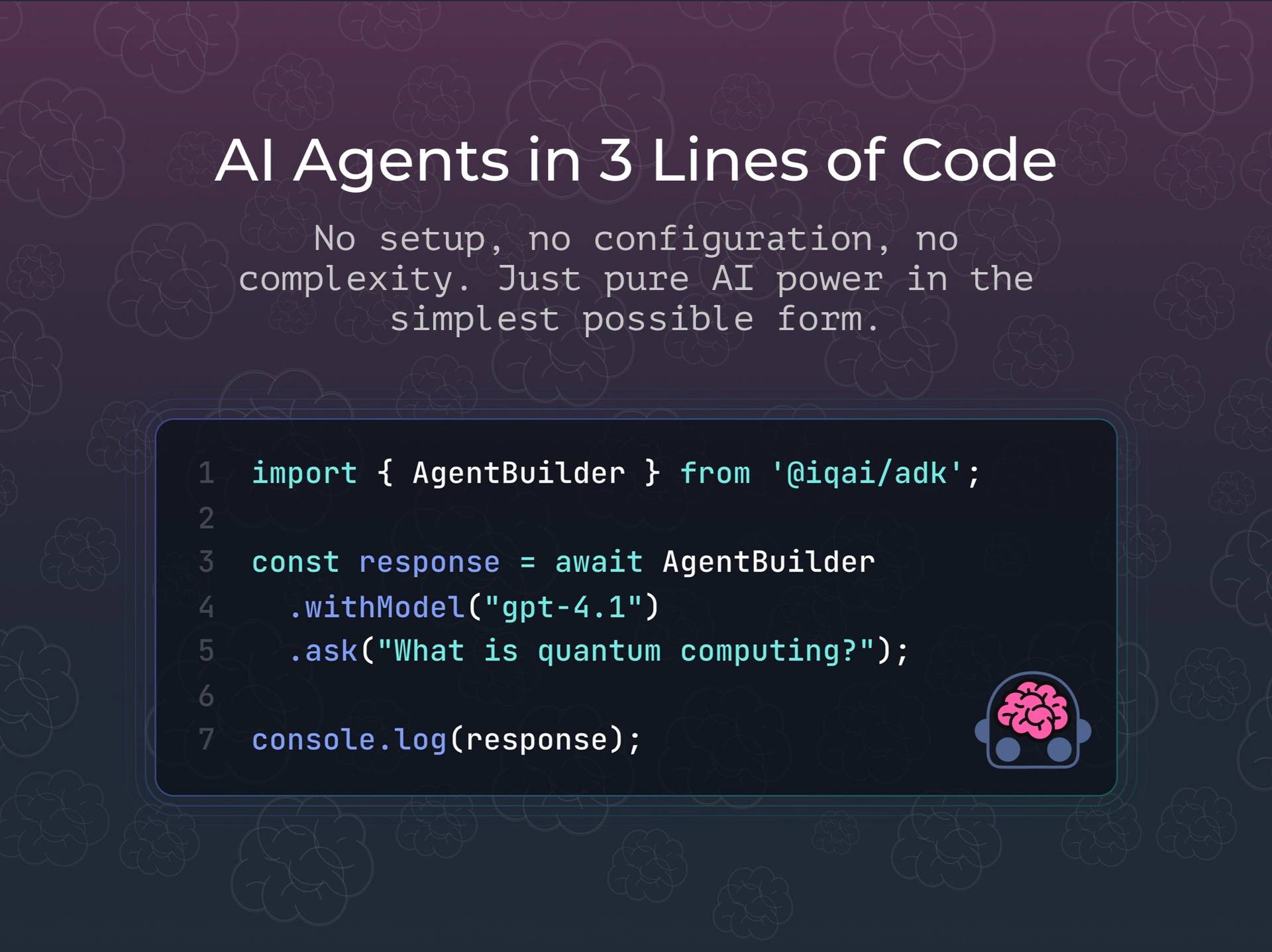ADK for TypeScript
Agent Development Kit (ADK) for TypeScript is an open-source framework created by IQ AI for the development, orchestration, and deployment of intelligent AI agents. It provides a TypeScript-first toolkit for building a range of AI systems, from simple question-and-answer bots to complex multi-agent architectures capable of performing real-world tasks, with a focus on type safety and modularity [1] [3].

Overview
The Agent Development Kit (ADK) for TypeScript is a framework that enables developers to construct multi-agent AI systems. Inspired by Google's Python ADK, it adapts the architecture for the TypeScript ecosystem, focusing on type safety, modularity, and developer experience. The kit supports hierarchical agents, integrates various tools, manages memory, and handles real-time streaming. Its role encompasses the building, orchestration, and deployment of AI agents [2] [4]. Launched on July 17, 2025, ADK for TypeScript supports developers in building AI agents [1].
ADK for TypeScript functions as a toolkit for creating diverse AI applications. Its design considers developer experience, offering features like autocompletion and type safety inherent to TypeScript. The framework's modular architecture allows for composition of agents, attachment of various tools, and integration with multiple large language models (LLMs) [1]. It is designed to scale from prototypes to production deployments, incorporating functionalities such as session management, persistent memory, and OpenTelemetry support for tracing and performance monitoring [2].
Key Features
ADK for TypeScript is built around several core features that support its use for developers. These features contribute to its capability to support AI agent development.
AgentBuilder API
The AgentBuilder API provides an interface for the creation of AI agents, aiming to reduce boilerplate code. This API allows developers to set up agents, supporting both simple agent instantiations and the construction of multi-agent workflows. Common patterns can be implemented, and the API is designed for gradual complexity, allowing developers to start simple and add features as needed. It is designed to scale with varying project needs, from basic agents to intricate systems [2] [4].
Multi-LLM Compatibility
The framework offers compatibility with a range of large language models (LLMs) through a unified interface. This allows developers to switch between different models such as OpenAI's GPT series, Google Gemini, Anthropic Claude, and Mistral, providing options in model selection based on specific application requirements. The system is powered by the Vercel AI SDK, and its provider-agnostic foundation supports developers in using various ecosystems [1] [4].
Modular Architecture and Tool Integration
ADK for TypeScript features a modular architecture that enables developers to compose agents and integrate various tools. Developers can compose multiple agents, equip them with custom tools, and orchestrate workflows. Agents can be equipped with ready-to-use tools or custom-built functionalities. Tool integration is facilitated via the Model Context Protocol (MCP), which supports tooling, function integration, and automatic schema generation, allowing connection to a range of MCP servers in the market or the creation of custom ones. This modularity provides developers with options in designing and extending their AI systems [2] [4].
Memory Management and Session Handling
The kit includes features for stateful memory and session management, allowing agents to maintain context and state across multiple interactions or sessions. This is for building AI assistants and autonomous agents that require persistent knowledge and continuity in their operations. Built-in session management and memory services are designed for enterprise deployment, supporting reliability and scalability [1] [4].
Tracing and Evaluation
ADK for TypeScript incorporates OpenTelemetry support for tracing and performance evaluation. This allows developers to debug agent behavior, monitor performance metrics, and gain insights into the execution flow of multi-agent systems. The tracing capabilities support optimizing agent performance and reliability in production environments. Additionally, it includes a built-in evaluation system to assess agent performance by testing final responses and execution trajectories [1] [4].

Multi-Agent Workflows
ADK for TypeScript provides support for orchestrating multi-agent workflows. It allows for the coordination of teams of agents to handle tasks and processes. The framework supports various orchestration logics, including sequential, parallel, and LLM-driven routing, enabling developers to design collaborative workflows where specialized agent chains can work together to achieve a common goal [2]. This capability is for building AI systems that can manage multi-step tasks.
On-Chain Capabilities
For developers working within the Web3 ecosystem, ADK for TypeScript offers support for integrating with blockchain and decentralized finance (DeFi) applications. This enables AI agents to interact with on-chain data and protocols. These capabilities are supported by a suite of specialized Model Context Protocol (MCP) servers developed by IQAI, designed to extend the capabilities of ADK TypeScript agents by providing integration with various external services and data sources. Examples of these servers include MCP ABI for smart contract interactions, MCP ATP for the Agent Tokenization Platform, MCP BAMM for Borrow Automated Market Maker operations, MCP Fraxlend for lending platform interactions, MCP IQWiki for IQ.wiki data access, MCP NEAR Agent for NEAR Protocol integration, MCP ODOS for decentralized exchange aggregation, and MCP Discord/Telegram for messaging automation [5].
Specific on-chain functionalities include:
- Analyzing DeFi positions on platforms such as Fraxlend and BAMM.
- Executing token swaps through decentralized exchange aggregators like ODOS.
- Managing tokenized agents on the Agent Tokenization Platform (ATP).
- Interacting with smart contracts directly via their Application Binary Interface (ABI).
- Bridging assets or information across different blockchain networks, including NEAR Protocol. These capabilities are supported by a suite of Model Context Protocol (MCP) servers for blockchain interaction, facilitating the creation of AI agents that can operate within decentralized environments [1].
